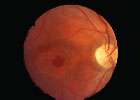Retinal photograph of right eye, showing mottled changes in the macular region. Credit: Wellcome Images.
Researchers from the Wellcome Trust Centre for Cell-Matrix Research in Manchester have revealed more about how a particular genetic change significantly raises the risk of developing age-related macular degeneration.
This disease, the major cause of blindness in the Western world, is preceded by the build-up of small yellow particles (drusen) in the retina. This leads to the death of photoreceptor cells and thus loss of central vision. Professor Tony Day, Dr Simon Clark and Professor Paul Bishop found that the Y402H polymorphism of the CFH gene altered the function of complement factor H, a key protein that helps prevent damage to the body.
This coding change reduces the protein’s ability to bind to the part of the retina where drusen accumulate, suggesting a potential mechanism through which age-related macular degeneration develops. The finding could help us develop new therapeutic strategies for treating or preventing the condition.
More information: Clark SJ et al. Impaired binding of the AMD-associatecomplement factor H 402H allotype to Bruch’s membrane in human retina. J Biol Chem 2010;285(39):30192-202.
Provided by Wellcome Trust


















